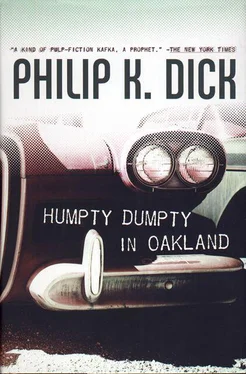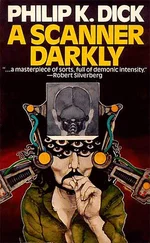“Oh yes, Mr. Miller,” the girl said. “We just sent a man down to your place of business. Did he succeed in finding you?”
“Yes,” Al said.
“Just a moment and I’ll connect you with Mr. Gam.”
Presently a deep middle-aged man’s voice came on the phone. “Mr. Miller,” the man said, “I’m Fred Gam. You were in discussing a spot with us, with Mr. Harman. If you’re still interested, we’ve batted the idea around among us and come up with something. It would probably be worth your while to drop by sometime early next week.”
“I could make it today,” Al said. “I’ll cancel all down the line.”
“Fine,” Mr. Gam said. “I’ll look forward to seeing you, say, around four.”
At four, Al closed up his lot and drove over to Teach Records. He found Mr. Gam to be a good-natured heavy-set man with gray hair, using an office that seemed the same size as Mr. Harman’s.
“Glad to meet you,” Gam said, shaking hands with him. On his desk he had a number of papers, through which he now glanced. “Well, Mr. Miller,” he said, “you want to join the organization, it seems.”
“Right,” Al said.
“Come along then.” Gam rose, beckoning, and Al followed him down a corridor, past one door after another.
They came out in a huge area in which men were working. The air was heavy with smells of machinery. Noise beat at Al’s ears, a constant mechanical din.
“This is the operation,” Mr. Gam said. “Where we do the actual pressing.”
It looked to Al like a tire-retreading outfit; he saw the same round machines, a man at each, the tops opening and shutting.
“You won’t be involved with this end,” Mr. Gam said. He led Al from the area and down another hallway.
Al said, “I consider Chris Harman the most inspiring human being I’ve ever had the privilege to meet. And in my business I see a good slice of mankind.”
“Yes, Chris said he ran into you at your car lot. You were obviously quite open with Chris, so we’ll be equally open with you. You came to us at exactly the right moment. You couldn’t have picked it better if you’d had some buddy planted in the organization.” He halted and eyed Al. “This job didn’t exist three days ago, and it has to be filled right now. It’s a good job, Miller. It’s ring-ding.”
“Fine,” Al said.
“Want to know what it was, Miller?”
“Yes,” Al said.
“Your sincerity,” Gam said. “Don’t ever lose that. It’s so God damn rare in this society of ours.”
“I could never lose it,” Al said. “Because I got it in a moment of supreme courage and danger. I got it in Korea. When the Commies had me pinned down. I got it when I faced death at the hands of a bayonet and the frenzied slant-eyes of a gook. I learned to know myself, Mr. Gam. I took a good look at myself, all I am, all my maker meant me to be. And that’s not something a man loses.”
After a moment Gam said, “I wish it could be shared. I wish it could be passed on to every man. I’ll never have what you have.”
“Afraid not,” Al said.
“You told Chris it wasn’t money. That reached him. For Chris, it isn’t money either. It never was and it never will be. Why did he go into the record business? Because he wanted to ameliorate the condition of the average man through the one thing that can ameliorate—not bigger cars or better TV sets, but through art, through music.” Mr. Gam pushed open a heavy door that led to a parking lot; he and Al slowly crossed the lot. “Naturally, there have had to be compromises. A business has to pay. We know that. It’s the harsh reality. That’s why there’s been Glee Records and—let’s face it—the Teach Catalog itself. You know the catalog, of course. It’s mostly trash. It’s supposed to be, because it serves the commercial market. Rock-and-roll, Negro jazz combinations, what they call race. Country, that is, Okie steel guitar. And pops. We’ve had a few hits. Teach has made the top ten, and made it often. Frank Fritch has been on Teach for years.”
“I’m familiar,” Al said.
“Frank Fritch’s piano meanderings has been one of our best sellers. And Georgia O’Hare and her Merrymen of Song. Our best-selling item in the catalog right now is ‘Pride.’ You’ve heard it in a thousand lunch counters all over America.”
They had entered another building now.
“Your concern,” Mr. Gam said, “will be the new label, the one that Chris Harman has always wanted to bring out but never could before. It’s called Antiqua. The long-playing record has made it possible. You’ll be in charge of promotion. You’ll receive a salary of seven hundred and fifty a month, plus traveling expenses—the usual expense account system, which we’ll work out gradually, as we get to know you better. And your base salary will go up, in due time.”
“I see,” Al said.
“We’ve bought this building here,” Mr. Gam said, as they walked down a newly painted hall. “We’re making it over. It’s not quite finished. Your office will be here.” He took out a key and unlocked a door; Al found himself looking into an office which smelled of paint.
“What will be on the Antiqua label?” he asked.
“Mr. Harman’s great project,” Mr. Gam said. “The medieval and early-Renaissance masses and choral works. Palestrina, Des Pres, Orlando Lassus. Polyphonic and monody. Gregorian, if possible; if there’s a market.”
It was a long way from a used-car lot, Al thought to himself as he gazed at the barren, newly painted and decorated office. Is this what I got for my pitch to Chris Harman? Is this what he saw in me, and in what I said?
Is this the man that is trying to swindle Jim Fergesson? The man who peddles the dirty version of “Little Eva on the Ice”?
He felt ill and discouraged. The whole thing made no sense to him, and unfortunately he had no pills with him, no Dexymil or Sparine, to help him out. All he could do was go on listening to Mr. Gam. He had gotten too far in, too deep into Teach Records and Chris Harman’s organization, to back out.
That night, as Al Miller sat across the dinner table from his wife, the terrible thought came to him again and again that Chris Harman was a completely reputable man, not a swindler at all. He offered me that job, Al thought, to rehabilitate me. “I’ve got some news,” he said to Julie at last, breaking his mood of introspection. “I got offered a job.” At once she said alertly, “What job?”
“For seven-fifty a month,” he said. “Plus expense account. And that’s just starting salary.”
“Seven hundred and fifty dollars?” she said, her eyes wide. “Tell me about it. What do you have to do? Who is it?”
“A phonograph record outfit,” he said. “It would be public relations.” His tone was so gloomy, so resigned, that her face fell. “It’s just a fluke,” he said. “I’m not qualified for it. I’d last about two weeks. Or two days.” He continued eating.
“But why not take it?” Julie said. “Maybe you’re wrong; you know you’re always so pessimistic, and you just sit around and let things happen—this job falls in your lap and you just sit there. You don’t exert yourself.”
“I exerted myself,” Al said. “I went out and got it.”
“Then you must think you can do it,” Julie said. “Isn’t that logical? You’re just having doubts, your usual doubts. I know you can handle it.”
Al said. “He just offered me the job because he felt sorry for me.” He could not rid his mind of the idea; it had been there ever since he had left Teach Records.
“What did you tell them? You didn’t turn it down, did you?”
“I said I’d consider it,” he answered. “I said I’d tell them by Monday morning.” That gave him three days.
Читать дальше










